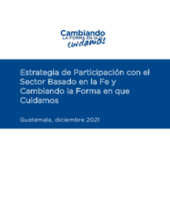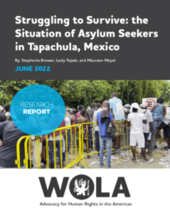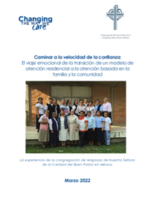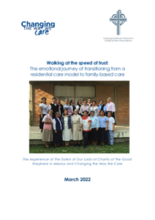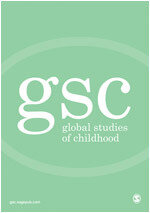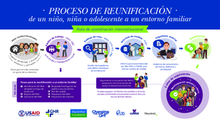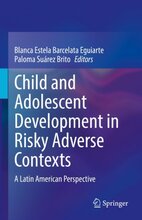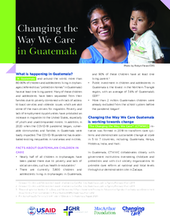Displaying 31 - 40 of 176
El presente documento pretende presentar una estrategia integral que involucre cuidadosamente al sector basado en la fe de Guatemala, con el objetivo de apoyar y promover el cambio en la forma en que el cuidado de los NNA es proporcionado por estos actores importantes y alineado con la visión de CTWWC. La estrategia está dirigida a quienes trabajen en la promoción de la transformación de servicios y el derecho a vivir en familia, y su trabajo está directamente relacionado con organizaciones basadas en la fe, es decir, directores de hogares de abrigo y protección, Obispos, sacerdotes, pastores, líderes religiosos y laicos comprometidos con el desarrollo humano integral de los NNA.
This report follows the route of asylum seekers arriving in Tapachula. It draws on a March 2022 visit during which the researchers conducted field documentation and interviews with asylum seekers, government officials, UN agencies, and civil society organizations providing services to migrants. The report highlights abuses, arbitrary treatment, and steep obstacles faced by asylum seekers at each step of their process.
These two case studies focus on kinship care: one describes kinship care in the Kenya context and the other describes family-based alternative care in Guatemala, including kinship care. They are meant to help practitioners better understand the practical implications of kinship and other forms of family-based alternative care and inform similar work in other contexts. These case studies have been produced by Changing the Way We CareSM, a global initiative implemented by Catholic Relief Services and Maestral International, and other global, national and local partners working together to change the way we care for children around the world.
Este informe documenta las primeras etapas de un proceso de aprendizaje entre Cambiando la forma en que Cuidamos y la Congregación de las Hermanas de Nuestra Señora de la Caridad del Buen Pastor en México a medida que ellas avanzan en su proceso de transición. Este documento está dirigido a los profesionales, las organizaciones y los actores católicos interesados en apoyar o participar en un proceso de transición con las organizaciones católicas y también proporciona información útil para aquellos que participan en la transición con actores no religiosos. Esto incluye un importante aprendizaje relacionado con la forma de acompañar a las religiosas en el proceso de transición, comprendiendo los matices relacionados con el tiempo, el contenido y el enfoque. Y lo más importante es que explora el componente emocional que conlleva el hecho de que las religiosas, adapten el enfoque de su carisma a medida que se transforman, pasando de proporcionar atención residencial a una atención basada en la familia y la comunidad.
This brief documents the first stages of a learning process between Changing the Way We CareSM and the Mexican Province of the Congregation of the Sisters of Our Lady of Charity of the Good Shepherd as the Sisters moved forward in their transition process. It is written for practitioners and organizations, including Catholic actors interested in supporting or engaging in a transition process with women religious and also provides useful information for those engaging in transition with non-faith actors.
Informed by a case review of 36 Guatemalan children supported to reintegrate into families, and interviews with social workers and psychologists engaged in the process, this article explores the role of the “community connectedness” wellbeing domain. The authors explore how community connectedness or lack thereof, can contribute to child and parent/caregiver wellbeing and successful reintegration—the different types of community connectedness and who/what was involved in establishing and fostering these connections.
Este gráfico está destinado a los profesionales que trabajan en los organismos gubernamentales y las organizaciones no gubernamentales que participan en diferentes aspectos del sistema de protección y atención, pero específicamente en el apoyo a la reunificación, y detalla las funciones y responsabilidades específicas de quienes participan en este proceso en Guatemala y cómo deben coordinarse.
This graphic is intended for use by professionals working within government agencies and non-governmental organizations in Guatemala engaged in different aspects of the protection and care system but specifically in support of reunification. It details specific roles and responsibilities of those engaged in this process in Guatemala and how they should coordinate.
The causes of institutionalization are multiple and the impact it causes is reflected in different areas such as the development of the child in general, such as mental, psychic structuring, health, and nutrition. Psychologically, children present alterations in their cognitive, emotional, sexual, and social domains with a high probability of developing several pathological conditions. This chapter presents an overview of this phenomenon based on several research investigations carried out in Spain, Latin America, and Mexico.
This two-pager highlights 2018-2020 results of the The Changing the Way We Care℠ (CTWWC) initiative for decision makers, government officials, media, other institutions or organizations working with children and adolescents, and private and public counterparts. CTWWC was formed in 2018 to transform care systems and demonstrate sustainable change at scale in 5 to 7 countries, including Guatemala, Kenya, Moldova, India, and Haiti. In Guatemala and around the world, more than 80-90% of children and adolescents living in orphanages (referred to as “protection homes” in Guatemala) have at least one living parent.

